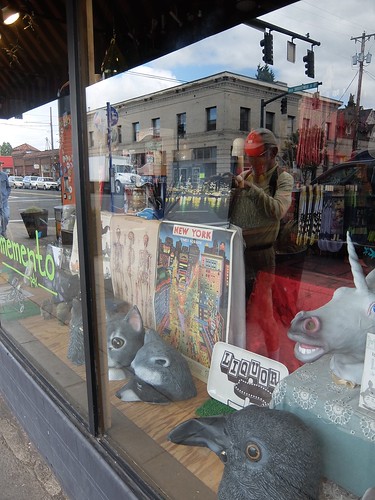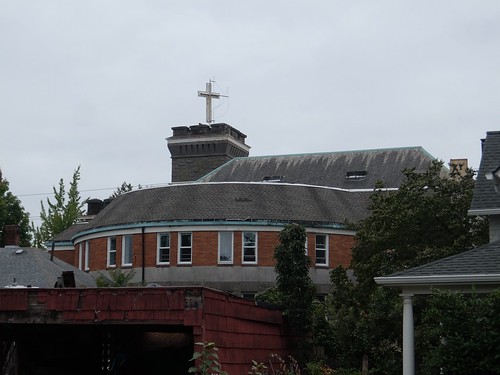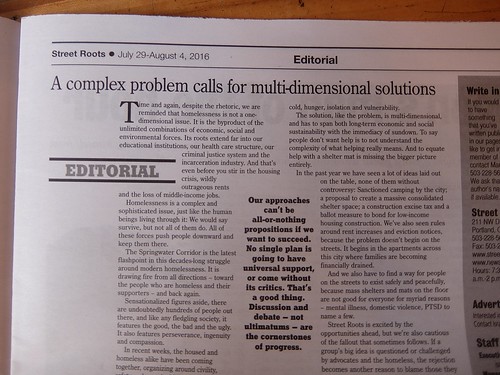My suggestion for John Taylor at Stump Town this morning, on Belmont, was that he consider real time social media, such as Blogger, as another outlet for his expertise.
John is working on an autobiography (see below), which promises to be interesting, however Portland is facing the "informal neighborhood" issue right now. Any advice?
John is an urban planner by training, sort of like my dad was. Dad was freelance, sometimes with USAID but also with UNDP and private companies.
For example, Jack worked for Whiting & Associates out of Omaha, contracted by the Libyan government to draw up fifty year plans, post Wheelus AFB era.
Dad's Rome-based team worked closely with Libyan counterparts. Drawing accurate maps was a lot of the process. They didn't have GIS / GPS in those days, at least not to the extent we currently enjoy.
Those plans for Libya were pretty much followed, my dad later learned, his career having since taken him to Manila, Cairo, Dhaka, Thimphu and Maseru. When looking ahead fifty years, it's mostly about zoning, not individual buildings. Where to site the cemeteries and like that.
Regional and urban planning is a process, not the top down imposition of a fait accompli by edict. The people who live in the area have a lot of influence. In Portland, our Neighborhood Associations play a role. Development is an organic process.
Anyway, we discussed what the US forward-basing approach in terms of aid might be today, given the evaporation of Communism as the credible threat. Many are eager to bring that back, as it seemed to work as a bogeyman, but most of the world has moved on from Cold War Era politics.
Probably what more urban planners will realize is the engineering community itself saw the wisdom in "publicly owned goods" what with the GPL / GNU / EFF revolution (MIT played a role). Their realizations extend to Open Data, now that Open Source (computer source code) is well established. That doesn't mean divulging everything, just a whole lot more.
Big companies, rivals, will work together on an even playing field, where key assets stay "unowned" (not "in-house", not under just one player's control). That's like Communism, but then who owns the stars? Is God a communist then? Unsettling.
The recent legal battle twixt Google and Oracle, over Java APIs, was interesting in this regard. What's a trademark? What's a language? Is Oracle the next SCO? The two cases have something in common, as other analysts have noted.
So in this day and age, the enemy is Fear Itself i.e. Terror, and those who promulgate terror, in whatever form (drunk drivers, bad doctors, ISIS, dodgy car makers ... KKK) become the ones we need to beat back and defeat.
Once language is reduced to truisms in this way, a loss of traction may be experienced, which may feel freeing. At least we know we're united against terror.
Going forward, the engineering sector still has an upbeat attitude about all the new free tools, and are actively reaching out to the world's as yet "unbanked" with all manner of schemes and devices, including with new methods bookkeeping (e.g. blockchain).
Engineering + Urban Planning + a Commercial sector willing to experiment with new kinds of advertising, are probably all we need to kick start it in Portland.
John was curious about the #CodeCastle meme. We toured the outside of the "ghost church" which could be a bigger version of Southeast Uplift or something like that.
I'm already in touch with the math teachers (some of them) by social media. Brick and mortar would be nice though, for more hands-on, but for that I have Monday Night Flying Circus (lots of math goes on there).
John is working on an autobiography (see below), which promises to be interesting, however Portland is facing the "informal neighborhood" issue right now. Any advice?
John is an urban planner by training, sort of like my dad was. Dad was freelance, sometimes with USAID but also with UNDP and private companies.
For example, Jack worked for Whiting & Associates out of Omaha, contracted by the Libyan government to draw up fifty year plans, post Wheelus AFB era.
Dad's Rome-based team worked closely with Libyan counterparts. Drawing accurate maps was a lot of the process. They didn't have GIS / GPS in those days, at least not to the extent we currently enjoy.
Those plans for Libya were pretty much followed, my dad later learned, his career having since taken him to Manila, Cairo, Dhaka, Thimphu and Maseru. When looking ahead fifty years, it's mostly about zoning, not individual buildings. Where to site the cemeteries and like that.
Regional and urban planning is a process, not the top down imposition of a fait accompli by edict. The people who live in the area have a lot of influence. In Portland, our Neighborhood Associations play a role. Development is an organic process.
Anyway, we discussed what the US forward-basing approach in terms of aid might be today, given the evaporation of Communism as the credible threat. Many are eager to bring that back, as it seemed to work as a bogeyman, but most of the world has moved on from Cold War Era politics.
Probably what more urban planners will realize is the engineering community itself saw the wisdom in "publicly owned goods" what with the GPL / GNU / EFF revolution (MIT played a role). Their realizations extend to Open Data, now that Open Source (computer source code) is well established. That doesn't mean divulging everything, just a whole lot more.
Big companies, rivals, will work together on an even playing field, where key assets stay "unowned" (not "in-house", not under just one player's control). That's like Communism, but then who owns the stars? Is God a communist then? Unsettling.
The recent legal battle twixt Google and Oracle, over Java APIs, was interesting in this regard. What's a trademark? What's a language? Is Oracle the next SCO? The two cases have something in common, as other analysts have noted.
So in this day and age, the enemy is Fear Itself i.e. Terror, and those who promulgate terror, in whatever form (drunk drivers, bad doctors, ISIS, dodgy car makers ... KKK) become the ones we need to beat back and defeat.
Once language is reduced to truisms in this way, a loss of traction may be experienced, which may feel freeing. At least we know we're united against terror.
Going forward, the engineering sector still has an upbeat attitude about all the new free tools, and are actively reaching out to the world's as yet "unbanked" with all manner of schemes and devices, including with new methods bookkeeping (e.g. blockchain).
Engineering + Urban Planning + a Commercial sector willing to experiment with new kinds of advertising, are probably all we need to kick start it in Portland.
John was curious about the #CodeCastle meme. We toured the outside of the "ghost church" which could be a bigger version of Southeast Uplift or something like that.
I'm already in touch with the math teachers (some of them) by social media. Brick and mortar would be nice though, for more hands-on, but for that I have Monday Night Flying Circus (lots of math goes on there).



